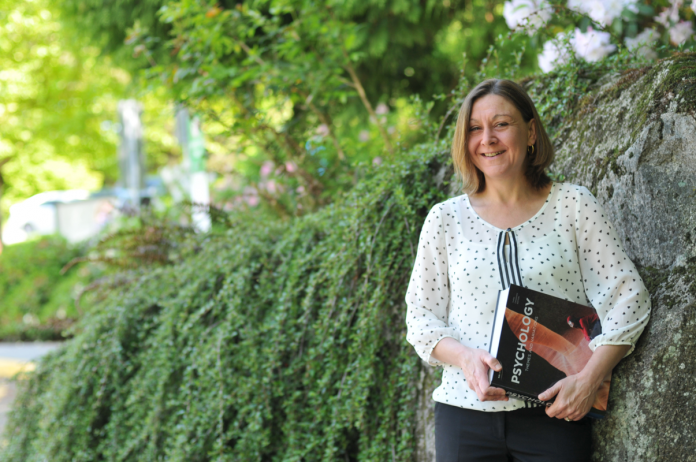By Ekanki Chawla and Manveer Dhaliwal
Andrea Hughes has been a psychology professor at UFV for about 11 years, and has taught nearly every psychology course in the discipline.
What brought you to UFV?
A lot of things. I was looking for a job in a smaller institution with small class sizes, so that was definitely a large component of what attracted me to this university. Before UFV, I had taught a few courses at Simon Fraser University, and one course at Washington University in St. Louis.
How would you describe the culture or the feeling you got when you first started here?
I really enjoyed the laid-back culture at UFV. That was something which was really attractive to me when I first got started here, especially with the new job and being new to the area. Everybody was also really casual and friendly, like, the janitors and the faculty were friends. I just thought the university had a really cool dynamic.
What kind of changes have you made in your teaching approaches or methods over time?
I’ve made a lot of changes, but I think the biggest thing is that I used to be very serious. I would just be like, “We have to get through the material today.” And now, if we spend some more time on one subject and we get behind on the day’s content, I realize that it’s not a big deal. So, I’m definitely a lot more relaxed in my teaching style now.
What kind of projects have you worked on at UFV, in terms of course development or research?
I’ve done a lot of student-partnered research projects looking at various topics, mostly related to memory. In the past, I’ve looked at cross-race effect, eyewitness testimony, and some work on priming. Sven Van de Wetering and I collaborate sometimes on projects more to do with social cognition. Years ago, I was highly involved with the Centre for Education and Research on Aging, where we did a lot of community partnerships. We did things like a symposium, and invited people in for different courses from the community, information courses, and even getting seniors engaged in university. We still do that a little bit, but we’re not as active as we used to be. Shelly Canning and Darren Blakeborough were heavily involved with a project on pairing young children and seniors in a care home for dance instruction — it was a really cool project. These little girls would come in every week to the nursing home, and do their dance practice with the seniors, and the seniors just loved it.
Have there been any colleagues or students that have been particularly influential to what you do?
Definitely. I’ve had several students where we just clicked really well, and it sparked some research — particularly through my memory course. The students really wanted to do research, and so we’ve travelled to a number of conferences, which was a great experience. In the department, I’ve collaborated with Sven a fair amount, and that led to us developing a course which we teach on social cognition. It’s funny, because that started out with us initially meeting every week in the resource room to casually talk about research. What we found was that we disagreed on a lot of things. Then we started having students asking to sit-in on these weekly meetings, and we thought, “Wait a minute, we can make a course out of this!” So we developed that course kind of just by chance, out of those regular meetings that student started attending.
While we often talk of UFV as a single entity, each student or teacher will take something different from UFV — how would you describe what you’ve taken from UFV?
I’ve definitely become a heck of a lot better teacher after my experience here. I’m continually learning in class; as you guys have probably heard me say, “I used to do it this way, and now I do it this way.” I think that’s the biggest thing though, that I’m always learning. That’s a huge goal for me. I think I’d be really bored in a job where I wasn’t continually being challenged, and having to learn new things.
What were you like as a student, did you procrastinate, and were you involved on campus?
I was pretty motivated as a student, and I was pretty committed to my studies, but I always procrastinated. I was always doing the paper at 3 a.m. in the morning. Always. But, I was very involved on my campus, too. Where I did my undergraduate, I was in lots of student unions and clubs. I’d go to campus at 8:30 a.m., and I’d stay until 9 p.m., because that was just the kind of campus culture there.
Do you ever get scared you won’t be able to answer students’ questions?
It really depends on the class. In third or fourth year courses, if a student asks me a question, and I don’t know, then I’m comfortable to admit that. They recognize that I can’t know absolutely everything. First and second year is a little bit different though, because they expect you to really know everything about everything.
What is one interesting thing about you that most students/faculty don’t know?
I was a competitive gymnast! Floor was definitely my favourite!
This interview has been edited for content and clarity.
Image: UFV Flickr


